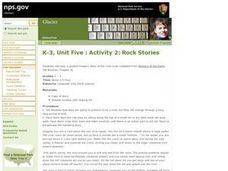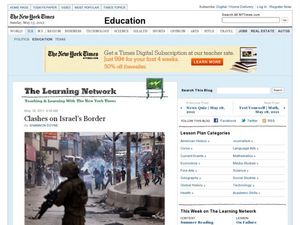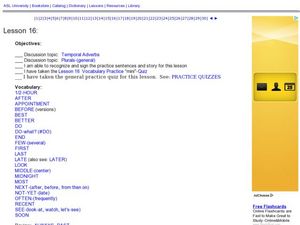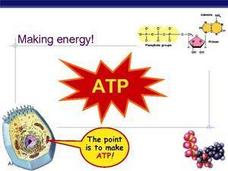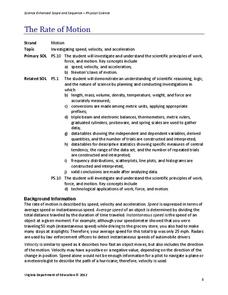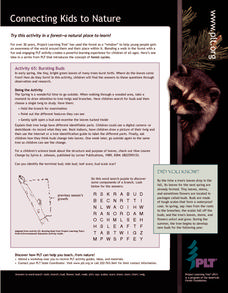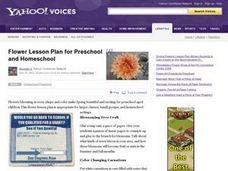Curated OER
Rock Stories
Youngsters pretend they are rocks sitting on a hill. They listen to the provided guided imagery script to conceptualize the process of how rocks change over time. They draw a diagram of what happened to them as rocks during the story. An...
Curated OER
Clashes on Israel's Border
Here are 11 questions intended to guide learners as they read a New York Times article about the violence and conflict between Israel and Palestine. They can review the questions and then read the article to help answer them. A link to a...
Curated OER
ASL: Lesson 16
ASL activity 16 covers adverbs of time, sentence structure, and asking questions. Each blue link takes you to an image, instructions, or video of the word/s being signed. Great resource!
Curated OER
The U.S. War in Iraq Officially Ends
Examine issues and events surrounding US withdrawal of troops from the Iraq War. After reading this New York Times article learners respond to each of the nine who, what, when, where, and why questions.
American Chemical Society
Isolation of Phytochrome
Why do soybean plants that are planted weeks apart in the spring mature simultaneously in the fall? Four independent activities cover the history of phytochrome research, scientist collaboration, the electromagnetic spectrum, and...
Chicago Botanic Garden
Plant Phenology Data Analysis
Beginning in 1851, Thoreau recorded the dates of the first spring blooms in Concord, and this data is helping scientists analyze climate change! The culminating instructional activity in the series of four has pupils graph and analyze...
Science Matters
Wave Watching
Seismologists use the direction and arrival times of p waves and s waves to determine the distance to the source of an earthquake. The engaging lesson has students line up to form human waves. Through different movements when attached,...
Curated OER
"Two Diamond Baseball" Review Game
Here is a game that can be used across the curriculum. Two teams are made up, and each time a member of the team answers a question correctly, they roll a dice to see how far they advance on the "baseball field." A fun game!
Curated OER
The Point is to Make ATP
Storing and transferring energy is explained here with reference to the fight or flight response, along with the need for activity in times of lowered nutrition. This is a great summary of ATP applications, and after the multiple stages...
Curated OER
How Does Your Garden Grow? Discovering How Weather Patterns Affect Natural Cycles
For the warm-up in this cool climate lesson, you will need to click on "Mapping" and then "US Mapping" once you arrive at NOAA's "US Climate at a Glance" page. Earth science explorers realize that 2012 was a warm winter for us. They read...
Curated OER
Citing MLA Style Worksheet
By the time they hit college, your kids will already have MLA citations down pat! Provide them with this packet to practice citing different sources using the MLA format. Four different resources are shown, and future researchers must...
University of California
Hot! Hot! Hot!
Calories are not tiny creatures that sew your clothes tighter every night, but what are they? A science lesson, presented at multiple levels, has learners experiment with heat, heat transfer, and graph the function over time....
Virginia Department of Education
The Rate of Motion
How much time does it take to jump over three balloons? Pupils calculate the speed of tasks that require different motions. They determine motions for tasks such as walking, skipping, hopping, and jumping before creating a...
Curated OER
My Shadow and Me
Practice making shadows with a kindergarten science experiment. After deciding which picture would represent the biggest shadow, kids use a flashlight to experiment with their own shadows. For extra fun, have kids mark their shadows...
Illustrative Mathematics
Tilt of Earth's Axis and the Four Seasons
Geometry meets earth science as high schoolers investigate the cause and features of the four seasons. The effects of Earth's axis tilt features prominently, along with both the rotation of the earth about the axis and its orbit...
S2tem Centers SC
Seasons
Winter, spring, summer, and fall—take the learning of the seasons beyond the elementary level to the middle school classroom. Curious learners begin by watching videos about the seasons and the rotation of planet Earth. Then,...
CK-12 Foundation
Seasonal Changes in Plants: Leaf Pigment
Leaves fall off the tree in the autumn, but why do they change colors? The interactive covers the role of chlorophyll and photosynthesis. It also explains both carotenoids and anthocyanins.
Space Awareness
Seasons Around the World
Why does Earth experience summer, fall, winter, and spring? Using an informative demonstration, learners see how the angle of the sun on Earth and the rotation of Earth determine the seasons. Scholars work in pairs to learn that the...
Curated OER
Investigation of Hooke's Law Lab
Students determine the spring constant by conducting an investigation. In this physics lesson, students collect data and create a graph of force vs. displacement. They compare the results of two different methods to find spring constant.
Curated OER
Bursting Buds
In this spring worksheet, students choose any of the 6 activities pertaining to the season of spring to do with their families. Students also may list the books about spring they have read.
Curated OER
Scavenger Hunt
In this daylight savings time activity, students use the internet to answer five short answer questions about daylight savings time. A website is included to assist students in finding the information efficiently.
Curated OER
Flowers
Young scholars create flowers out of coffee filters, green construction paper, pipe cleaners, scissors, and glue in this quick and easy pre-Kindergarten lesson for Spring time. The lesson is broken down into six short steps with clearly...
Curated OER
Shamrock Fun
Students create small shamrock replicas using green and white paints, paper, bubble wrap, and gold glitter. This lesson intended for the early-elementary classroom is ideal for celebrating St. Patrick's Day or spring-time in general.
Curated OER
"Garden Springs Gardeners"
First graders ponder the question of how plants help their lives. They observe and compare properties of several different plants. Differentiate between living organisms and nonliving objects.
Other popular searches
- Reading Spring Time
- Spring Time Bulletin Boards
- Spring Time Acrostic Poetry
- Art Spring Time
- Writing Spring Time
- April Spring Time
- Spring Time Crafts
- Art for Spring Time
- Spring Time Music
- Limericks and Spring Time
- Spring Time Climate
- Spring Time Activities
